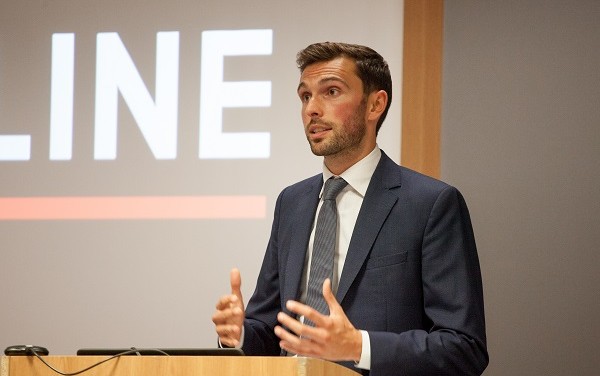
The children’s social care review has maintained its position that children’s services open too many investigations into families, despite Ofsted rejecting this.
Responding to the sector’s feedback to its ‘case for change’ report published in June, the review said it was important to resolve why the number of child protection investigations that did not result in a child protection plan had increased threefold in the decade to 2019-20.
In the ‘case for change, the review, led by Josh MacAlister, cited this statistic to claim that “the system too often focuses its efforts on investigating and assessing parents without providing real help for the family to deal with the problems they are facing”.
Councils ‘not over-investigating’
In response, Yvette Stanley, Ofsted’s national director of regulation and social care, said her organisation’s findings “do not suggest that local authorities are carrying out unnecessary child protection investigations”.
“Generally, we are more likely to report that a local authority is too slow to take decisive action when children may be at serious risk of harm,” she said.
In evidence, Ofsted had cited the fact that 84,000 children had a child in need plan 45 days after the start of a child protection investigation, under section 47 of the Children Act 1989.
The care review said it accepted this position but added that it “had not seen evidence from Ofsted or other respondents to suggest that a section 47 enquiry is the most appropriate mechanism for families to receive support under a child in need plan, or evidence to justify this volume of investigations or the rise over the last decade”.
The review said it was continuing to work with the inspectorate to “interrogate the area of child protection investigations further”, including whether Ofsted’s own inspections looked equally for evidence of under and over investigation.
“We can be both too driven by investigation with some families while failing to protect some children,” it added.
In response to the review’s summary, an Ofsted spokesperson said: “Multi-agency decisions when children may be at risk of significant harm have to be taken quickly, often with limited information and in the face of considerable anxiety from partner agencies making the referral.
“We are looking at our own data and findings and sharing them with the review team to help inform their work.”
Tension between support and protection
The case for change suggested that early help and child protection services could be separated to ease a “tension” between the two.
“How do we address the tension between protection and support in children’s social care that families describe?” it asked. “Is a system which undertakes both support for families and child protection impeded in its ability to do both well?”
Review chair Josh MacAlister has since acknowledged “significant concerns” raised by organisations including the Association for Directors of Children’s Services (ADCS) that the two services were part of the same “continuum”. He also said that reforms to separate high-risk probation work from lower-risk services had failed.
In its latest response, the care review said that, while some respondents with experience of social care had backed separation, those representing the social care workforce had disagreed, warning it would create silo-based working.
It said a “recurring theme” in responses to the case for change was that “the tension can be tackled by addressing social workers’ approach and capacity”.
Respondents said social workers “needed to be sufficiently skilled and knowledgeable and have the capability to balance risk management with relationship building”.
The review also responded to criticisms that it had unfairly represented social workers in its conclusion that the quality of child protection decision making was inconsistent and often not good enough.
It said it was not “criticising the many dedicated individuals who do an incredibly challenging job, but rather the systems within which they work”.
Austerity debate
Respondents to the case for change, including children’s rights charity Article 39 and the Care the Review Watch Alliance, criticised the review for playing down the impact of central government’s austerity policies since 2010 on council spending on children’s services.
The case for change highlighted a decrease in spending across the country on “non-statutory” preventive children’s services from around £3.5bn in 2012-13 to £2.3bn in 2019-20, with “statutory” funding for interventions increasing from £6.6bn to £8.2bn in that time.
These organisations said the case for change should have used 2010, when the coalition government came to power, as its baseline year instead to give a truer reflection of the impact of austerity.
In its latest response, the review said it recognised that some organisations wanted it to directly criticise the government for spending cuts and rising poverty.
But it said it used 2012-13 as the baseline year as those figures were the earliest that were directly comparable with those for 2019-20.
“Many of the problems described in the case for change were present in 2010 when spending levels were higher,” it added. “Child welfare inequalities must be understood, accounted for and addressed and the review’s recommendations will have a focus on this”.
Related articles
Unregulated accommodation row
In September, the government introduced a ban on unregulated accommodation for children aged under 16-years old, with many campaigners calling for it to be extended to those aged up to 18. Instead, the government has proposed to regulate currently unregulated semi-independent and independent accommodation but on a lighter-touch basis to children’s homes, meaning they would be required to provide support but not care.
The review noted that many respondents to the case for change criticised it for not supporting an extension of the ban to provision for 16- and 17-year-olds; but it refused to change its position.
“We acknowledge this is an area where there are strong feelings and legitimate concerns,” said the review. “We have said that focusing on how new standards for these homes can improve quality and ensuring that the option of semi-independent living is only used where it is in the best interests of children, is the fastest route to improve the urgent situation for young people in the system now.”
It said it would continue to speak to children and young people about the issue before coming to a conclusion.
Carolyne Willow, director of Article 39, said the care review’s continued refusal to support an extension to the ban “shows there has been no reflection or movement”.
“Today’s document claims that the government’s proposed standards for supported accommodation are the quickest means of improving the plight of 16- and 17-year-olds living in supported accommodation,” she said.
“This misses the point that the draft standards deliberately miss out any requirement to provide day-to-day care for children who are still in care and completing their compulsory education and training.”
Review to focus on omitted areas
In total, 324 people and organisations responded to the case for change and some urged it to consider topics it had not covered.
The review said it would investigate many of these issues before it publishes its final proposals next year.
“An example of an area we should have devoted more time to in the case for change is the particular risks faced by unaccompanied asylum-seeking children (UASC) and migrant children,” it said.
“As with all of our omissions from the case for change, this is an area we will actively work harder on ahead of developing our recommendations.”
A spokesperson for the care review said that it published the feedback summary to encourage further debate and improve its own final recommendations.
“Given the diversity of viewpoints, it is also the case that debate and even disagreement were going to be a natural part of the process,” they said.
“Encouraging discussion and airing these points of difference publicly will lead to better recommendations at the end of the review.”




 Bournemouth, Christchurch and Poole
Bournemouth, Christchurch and Poole  Hampshire County Council
Hampshire County Council  Lincolnshire County Council
Lincolnshire County Council  Norfolk County Council
Norfolk County Council  Northamptonshire Children’s Trust
Northamptonshire Children’s Trust  South Gloucestershire Council
South Gloucestershire Council  Wiltshire Council
Wiltshire Council  Wokingham Borough Council
Wokingham Borough Council  Children and young people with SEND are ‘valued and prioritised’ in Wiltshire, find inspectors
Children and young people with SEND are ‘valued and prioritised’ in Wiltshire, find inspectors  How specialist refugee teams benefit young people and social workers
How specialist refugee teams benefit young people and social workers  Podcast: returning to social work after becoming a first-time parent
Podcast: returning to social work after becoming a first-time parent  Podcast: would you work for an inadequate-rated service?
Podcast: would you work for an inadequate-rated service?  Family help: one local authority’s experience of the model
Family help: one local authority’s experience of the model  Workforce Insights – showcasing a selection of the sector’s top recruiters
Workforce Insights – showcasing a selection of the sector’s top recruiters 

 Facebook
Facebook X
X LinkedIn
LinkedIn Instagram
Instagram
”1 in 10 children in 2018 had a social worker in the past six years (Department
for Education, 2019b), and it is estimated that 25% of children will have had a social worker before their 16th birthday (Jay et al., 2020)”.
Moreover the report highlights that these children and families are not receiving lots of resources and support, instead that are being investigated and stressed out by the process.
I don’t understand how Ofsted think it is right that 25% of children have a social worker before they turn 16; its clear that their denial of the issue will lead to 50% and eventually 100% of children.
Josh MacAlister is right to hold firm on this point.
Agreed. The argument from OFSTED that it’s ok to have such a massive increase in section 47s, because many result in a Child in Need plan is not credible.
Why should so many families have to undergo a CP investigation before they can get help and support?
And how many of those families actually want a CIN plan (which is meant to be voluntary) and how many are too scared to decline the ‘help’, in case this results in a CP plan instead?
Because help and support costs money that Local Authorities don’t have because of direct cuts to funding by the Conservative Government.
Levelling down, cutting financial support to poor families such as cuts to Universal Credit will just put even more families under the pressure of poverty and will only increase stress and reduce families abilities to manage.
This particularly vile nasty Tory Government hate poor people and would rather they feel the power of the state in their lives, they have no intention of helping families.
Please don’t blame Social workers who do a very difficult job and are faced with the miserable lives of the poor day in day out.
Sure, I wasn’t blaming the social workers. I agree with you about cuts etc. I am a social worker. I’ve done plenty of CP investigations.
My comment was more about Ofsted’s seemingly blase response, that it’s apparently ok for families to go through CP investigations, because so many of them ‘end up’ with a CIN plan.
Which I don’t think is ok, for all sorts of reasons, including those that you quite rightly emphasise.
Quite. I have never known Ofsted to identify and comment on an unnecessary s47 enquiry or Child Protection plan, or to give much attention at all to family justice. I think they are a significant part of the problem in that they elicit LA anxieties that encourage an oppressively “risk averse” (as much as I hate that term as applied to child protection work) working cultures and practices. I’d not just stand by the reviews point on this, I’d be directly criticising Ofsted.
I vividly recall my studies to qualify and thinking then that s47 powers seemed drastic and like something that would justify use only in the most serious circumstances. Sometimes I catch myself at work using them because the professional network is worried about something it doesn’t know rather than something it does and wonder how we got here.
I agree. Just by looking at the statistics, the comparison between 2010 & 2020 speaks ….no it shouts…..that there is a serious problem.
The number of Looked After Children has nearly doubled. The number of children removed from their families due to physical and/or sexual abuse has fallen. But the number removed for “neglect and emotional harm/abuse has risen significantly.
I agree with the care review and the comments. There is something going wrong with child protection in this country.
Too many children are in care and being placed for adoption, not as a last resort but as the only resort because there appears to be no capacity to focus on building relationships and providing support to families often in cases where there is no evidence of harm.
To CP
I’ve been a Social Worker for 21 yrs and had the privilege of working in a number of different areas. I agree that there is a significant lack of capacity for LA’S and voluntary agencies to focus upon building relationships and providing support because there is no money.
However, I have never come across an instance where there is ‘ limited or no evidence of harm’ when considering adoption as the best solution available for the child or children in question. And British courts make it very, very clear that when it come to considering and granting a placement order for adoption, ‘nothing else will do’. I would like to see your evidence for your statements.